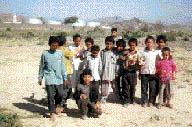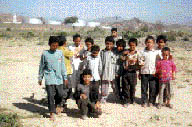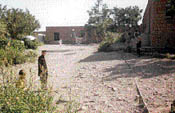
Taiz Orphanage: Reality and Ambition [Archives:1999/50/Governance]
December 13 1999
By: Imad Al-Saqqaf & Farooq Al-Kamali

Hence, we will talk about our children, Yemeni children who are deprived of their rights, about orphans who find themselves without parents. They seek for careful hands, for kind hearts and for warm laps. They have found themselves bearing responsibility too early and become gray-haired too early.
We will talk about children who wear torn clothes and walk barefoot, about those children who are abandoned by their families, to find themselves in the streets begging and/or becoming delinquents in a society where their rights are not taken care of. The society does not even provide them with a shelter.
Every year witnesses an increase in the number of poor children and juvenile beggars. We also see a lot of children who abandon school because of their bad conditions.

As we reached the house, we were astonished when we saw orphans washing their bodies in a hole which is full of mud and polluted water. Then, we reached the school of the house, which was built by Haeil Saeed Group. In the classroom, we saw two kinds of students. Some wear school uniforms, have new bags and shoes, while others wear rags, walk barefoot and have naked bodies. We find out that the miserable children are those orphans who are living in the house while the other children were pupils coming from neighboring villages to study at the orphanage school.
We met some of orphans who told us that teachers beat them. Some of them said that their brothers brought them to the house. One of those orphans said that the house has become everything in his life. They complained of not having exercising games. They all wish that they could to play.
A 15 year-old child said that he prefers living at the orphanage to living on the streets. All orphanage children say their food is good, but there is not enough. Hence we put this problem before the office of social affairs in Taiz which is responsible for orphan affairs.
Touring orphans’ bedrooms we found their beds were neat and the rooms clean, but we noticed sticks under the beds. The Deputy Director of the house said the area around the orphanage is full of snakes, which get in through broken windows of the bedrooms and panic children, so they keep these sticks under their beds to defend themselves.
The situation at the orphanage in Taiz is regrettable. We did not find any sign to presume it is a house for taking care of orphans. The house looks like it is just a dwelling for them. The orphanage is supposed to be a scientific, professional and moral school for orphans.
Orphanages should be centers of recreation, sport, technical and cultural activities. Many talented people in poetry, art, songs and theatre around the world graduated from orphanages. So, there must be a section in orphanages for various activities where talents could be spotted. There must be a professional workshop to train orphans in all professions such as smithery, carpentry and electrical engineering. These professions will help orphans in their lives after they leave the orphanage. Hence, orphanages must be religious schools where orphans learn the Holy Qura’an, sermons, and prayers. Their behavior will be polished and they will be virtuous individuals in their society.
The aim of an orphanage is to take care of orphans and pay attention to them, not just to keep them inside the house as prisoners. An orphanage must be a distinguished school compensating orphans for the sympathy of parents which they need. They must feel that there are some people who help them. They must learn many things which may help them as they leave the house, but unfortunately, we found a lot of orphans who are bound with chains and/ or locked up in small rooms. In Taiz orphanage, we did not find a sports stadium. We saw a workshop and a library, both closed, and a closed room where some orphans are locked up.
The situation is bad, therefore, we call upon the Ministry of Security and Social Affairs and all charitable people to work for improving this situation.
In fact there are good efforts on part of the administration of the house, and by some of the social personalities in the private sector and the non-governmental organizations. We have also seen major efforts expended by Miss Faidah Haeil Saeed who organized the charitable day for the sake of the orphanage at the beginning of November. There is a bazaar organized at Mohammed Ali Othman school, the profits of which go to the house. The Director of the house says that they are doing their best to improve its conditions, but there must be much support from the government and charitable people.
To know more about the situation of the orphanage, we asked Mr. Ahmed Kasham, director of the house in Taiz who said, “The Orphanage was founded in 1980. This house is one of the social centers which qualifies and takes care of orphans, including those orphans who committed such crimes as killing, stealing and sexual matters. The house protects homeless children and takes care of them. Those who have committed some wrongs are sent to the house by prosecution, while those who have certain social, economic circumstances are sent to the Ministry of Social Security to look upon their cases, and then they are sent to the house.” There is a primary school for orphans, and for those who come from the neighboring villages. The total number of students is 800, while the number of the students who live in the house since its establishment is no more than 40 students. Some of the orphans are studying in high schools and at the university under the supervision of the orphanage.
There are many obstacles that thwart our ambitions. We have to build a second floor to accommodate more juveniles in addition to repairing the building and overall refurbishment. We need clothes and shoes for the orphans, and to re-operate the workshop, we need a high-voltage electric power connection. We need to change the old beds, buy new cloths for orphans and connect electricity. We are in need of various pieces of furniture and new lockers for the juveniles to keep their things. We also need to provide books and sports equipment.
The house suffers a lot from water shortage, this makes the house in need of additional quantities of water to plant trees and flowers in order to add a beautiful view to the house, and to give a good impression to visitors.
The house offers good services to those children whatever their cases are. Its role goes along with guidance and creating awareness. Undoubtedly, children who live in the house come from different social environments, but at the house they become well trained, and gain good manners.
Regarding the professional field, it is one of the main aims of the house. There is a professional workshop, but it does not work because there is no electrical current (high voltage). The workshop needs more 200kw generators. The director of the house highlighted the religious aspect saying, “We concentrate on this side because of its importance in the behavior of orphans and to protect them form going astray. We also teach them Qura’an.” He addressed their assistance by saying, “The health office for social affairs supports the house by giving drugs, and sweets on certain occasions.” Mr. William Ken, Representative of Mamadani Association and the Director of Jiblah hospital also supports those orphans who live in the house. He, with Haeil Saeed group, fixed and connected water pipes, bought chairs and tables for teachers and repaired bathrooms. They also brought all school requirements, kitchen utensils and drugs. They spent money for some surgical operations for orphans. Haeil group built a school consisting of six classrooms. They bought mattresses, repaired windows and presented some meals on the religious occasions. They also buy cloths for orphans on the occasion of Greater Bairam. Al-Hekma Charitable Association provides clothes for orphans every year, mainly in ‘Ramadan.’
Mr. Abdulhafiz Mohammed Taha and his brothers and Mr. Abdulbari Haza’a Taha and his brothers presented electricity service since the year 1988, and they also provided some plastic materials to the house. On the other hand, Sweden Children Care Association provided a complete welding workshop, some chairs and tables for the house restaurant, fridge, television and video and a tennis table. The Swedish association provided these through Mr. Abdulwahab Al-Qorbani and Miss Jalelah Shoga’a. Miss Shoga’a also provided 108 chairs through the Social Fund for Development.
We met Mr. Sheik Zen’allah Shagerah, general manager of the social affairs office, who talked about the role of the office by saying,”The office offers services to all social categories, we do our best to improve and develop social care services for those orphans who live in the house. The services are confined to clothes, food and health care.
Through a meeting with the director of the house, we found that the volume of assistance is big, but we did not see any improvement in the services at the house. The director said children receive cloths and shoes from different donors, but as we saw the children were putting on tatters. The orphanage needs serious action. The orphans need to be taken good care of. We have to join hands to improve their living, because the condition is very bad. It is a shameful to receive the upcoming century with such aggravated problems facing our orphans. We hope to visit this house to find it a better condition dwelling or enough food.
Unfortunately, there is no house for female juvenile delinquents in Taiz, especially after the increase in number of girls who are wandering here and there. We heard that a lot of girls were raped or killed, and this happened because there is no house to protect these girls. Hence, we call upon social affairs office, all charitable people and all organizations interested in children affairs to build a house for juvenile girls.
Finally, I would like to offer my thanks to Yemen Times for its interest in social affairs.
——
[archive-e:50-v:1999-y:1999-d:1999-12-13-p:./1999/iss50/govern.htm]


